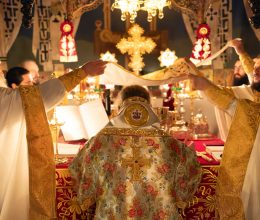Once upon a time, together with the Elder Joseph from the seed of David, Mary was also registered in Bethlehem, who was carrying the immaculate Conception in her womb. When the time for delivery came, and there was no place in the inn, a cave appeared to the Queen as a beautiful palace. Christ is born, to raise up the fallen image early.
(Troparion for the Eve of the Nativity)
The holiday of Christmas is shown as the fulfillment of everything that the human heart desires in its depths; the fulfillment of primal longings, expectations, and beliefs of all people from all generations. Christianity gives a new name to everything that humanity has invested in its belief in absolute goodness, in the meaning of life, in its reason and divinity – and that name is Christ, the God-child from Bethlehem. Christmas, which at the same time crowns all human feelings and expectations, corresponds to the insatiable thirst for meaning, goodness, and beauty among people and at the same time marks the beginning of correct knowledge of God, of higher divine revelation, of infallible worship and adoration of the true God in the Trinity, through the incarnation of the Word of God, which itself is the source of all life, which is the content and purpose of life. “Your birth, Christ our God, enlightened the world with the light of knowledge” – we sing in the troparion of Christmas.
Today, powerful beams of light mysteriously shone in the Bigorski Monastery of St. John the Baptist, where, like in a mental Bethlehem, a multitude of worshipers gathered with our monastic community to pay homage to the “newborn King of the Jews,” the Son of the Virgin Mary and the Savior of our souls. Inside the temple, the rich liturgy, with its beautiful hymnography, already immersed us deeply in the great mystery of the Feast of the Nativity of Christ. Specifically, according to the established liturgical typikon, the sequence of the so-called royal (or great) hours was served, which actually reflects the eve of Christmas.
They are called royal because they were performed in the presence of the emperor in ancient Eastern Roman Empire and concluded with many years for him, as well as for the patriarch. The main feature of the royal hours consists of singing the twelve festal troparia, reading selected psalms of David, Old Testament prophecies, apostolic and evangelistic readings, whose content represents the meaning and significance of the feast. The prophetic echo of the Old Testament finds its response in the apostolic readings and in the beautiful verses of the troparia. Meanwhile, the excerpts from the Gospel already clearly narrate the great mystery of the incarnation of the Word of God.
Particularly luxurious in content is the ninth hour, when the canonarch recites the moving hymn “Today the Virgin gives birth” in a solemn and harmonious manner. In accordance with ancient tradition, our canonarch first recited the many years for the primate of the first-throne Mother Church in Constantinople and the Ecumenical Patriarchate, His Holiness Bartholomew, and then in order for all the other primates of the local Orthodox Churches, including our revered Archbishop, His Beatitude Stefan. This solemn service ended with a many years prayer in honor of our venerable ruling hierarch, His Eminence Metropolitan Timothy, and finally for our elder and abbot, His Grace Bishop Partenij.
After this unique and beautiful service of the Royal Hours, the mystery of the Divine Liturgy according to the rite of St. Basil the Great followed, combined with the festive Vespers. Inspired by the festive atmosphere in the appropriately decorated church, Elder Bishop Partenij, who presided over the service, wished everyone a good and grace-filled Christmas and called on the faithful to empty their minds of the vanity of this world and not allow their hearts to become insensitive Bethlehem inns where there is no place for God, but to transform them through kindness, love, and compassion into humble and pure Bethlehem caves, where the born Christ may dwell.
The most joyful, however, for the approaching of Christ’s birth, were certainly the youngest ones. Pure children’s hearts clearly and vividly feel and see the mystery of God’s incarnation. Therefore, they are the strongest messengers of the joyful news. This was also the case today, when dozens of children from the Debar-Reka region, with illuminated faces and sparkling eyes of joy, harmoniously sang the well-known Christmas carol “Eternal God” to the Elder Bishop g. Partenij. Delighted by the pure faith and joy of these local carolers, he gave each of them a Christmas package, rich with sweets and toys.
The child has neither power nor strength, but it is precisely in its weakness that it shows itself as a king, precisely in its weakness and vulnerability lies its incredible strength. And the Child from the distant Bethlehem cave would not want us to be afraid of Him. It enters our hearts not with threats, not with proof of His power and authority, but only with love. As a Child, He gives Himself to us, and again as a child – we can love Him and surrender ourselves to Him in return.
Merry Christmas!















